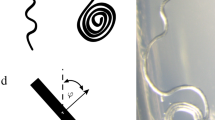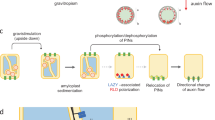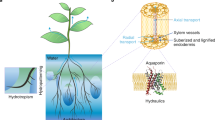Abstract
UNTIL recent years it was a generally accepted view that the region of perception of gravitational stimuli in roots was the extreme tip of the root. Cholodny,1 however, performed experiments in which he replaced the root tip in maize by the tip of the coleoptile, and the fact that a positive curvature was still obtained suggested that the function of the root tip might not be so simple as had hitherto been supposed. More recently, Keeble, Nelson, and Snow2 performed experiments in which positive geotropic curvatures were obtained when unstimulated root tips were stuck on to stimulated root stumps which had been decapitated before stimulation.
This is a preview of subscription content, access via your institution
Access options
Subscribe to this journal
Receive 51 print issues and online access
$199.00 per year
only $3.90 per issue
Buy this article
- Purchase on Springer Link
- Instant access to full article PDF
Prices may be subject to local taxes which are calculated during checkout
Similar content being viewed by others
References
Ber. deut. bot. Ges., 42, 1924.
Proc. Roy. Soc., B, 105, 1929.
Author information
Authors and Affiliations
Rights and permissions
About this article
Cite this article
HAWKER, L. Perception of Gravity by Roots of Vicia Faba. Nature 129, 364–365 (1932). https://doi.org/10.1038/129364b0
Issue Date:
DOI: https://doi.org/10.1038/129364b0
Comments
By submitting a comment you agree to abide by our Terms and Community Guidelines. If you find something abusive or that does not comply with our terms or guidelines please flag it as inappropriate.



